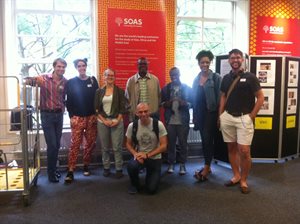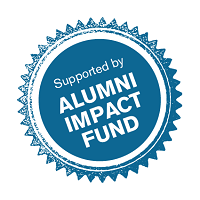Carmen Thompson, MA African Studies
“This qualification from SOAS, which is an internationally recognised centre for training in African languages, is going to be a fantastic addition to both my PhD funding application and my broader CV... I feel like I have taken the first step on my journey to a future career researching and working in the East African region.”
Overview
I took part in the Essential Swahili course at SOAS University. It was a two week semi-intensive course, taught by an expert lecturer from the University. The course taught not only the essentials of the spoken Swahili, but also some important historical context to the language as a whole and its influence from other dialectics such as Arabic, Portuguese and German. Each week we would have a mixture of teaching and oral practice, which was supplemented by tasks and exercises to complete at home and discuss in the following session.
What were your main achievements?
One of my main achievements was building the confidence to speak out loud in front of others, despite the fear of wrong pronunciations or sentence structuring. This has been one of my main setbacks in learning languages in the past. For example, I can read and understand French, however due to low confidence at school I was never able to develop my spoken skills to the same level. I was determined for this not to be the case this time round, and we were incredibly lucky that the teacher created what felt like a very safe and judgement free space to try out and practice my Swahili. I actually found that my pronunciation was quite good! I also discovered the rewards of continued verbal practice.
What did you enjoy the most?
I grew up in Kenya, but never mastered Swahili, so one of the main things I loved about the course was being able to finally feel a connection to the language. Not only learning how to speak it, but also about some of the history of its development and the cultural activities and practices that surround it. In addition, I loved the group of other students that were in the class. It was such a mixed bunch of people who were there for a diverse range of reasons. For example, one man with a Kenyan wife wanted to be able to speak her native language with her, a journalist, a humanitarian worker and a doctor. As well as learning, we all had a good laugh together too and even went on a group lunch at the weekend. Above all, everyone was just so encouraging of each other, which I believe really helped with building my confidence and improving my learning overall.

What were the hardest aspects?
At a purely linguistic level, I found the nouns the most tricky to get my head around! In Swahili there are 8 noun classes (m/wa, m/mi, ji/ma, ki/vi, n, u, ku and pa/ku/mu). Since most sentences in the language start with a noun and go from there, you need to know what class the thing you want to talk about is in before you start the sentence… There are rules for which noun goes in what class, for example “m/wa” is usually people or plants, however sometimes they seem a little arbitrary! Even once you know, the sentence structuring is still very complicated and it definitely was the lesson that took me the longest to understand. There was one guy in the class who spoke five other languages and I think that made him much more comfortable with those kinds of linguistic concepts, so he was able to help me a lot. I also spent a lot of extra time at home reading about the nouns and practicing constructing sentences. E.g. Mtoto wangu mmoja mrefu anacheza mpira (My one, tall child is playing football!)
What skills have you developed?
Perhaps most obviously, I now have the beginnings of a verbal fluency in the Swahili language! The teacher, Donovan McGrath (who actually wrote the set text we worked from, Colloquial Swahili) explained at the beginning that although it was a beginners class, it was designed to equip us with the skills to get straight out talking. We learnt a lot about grammar and rules, but he seemed to teach us the most important and most used ones first.
After the course was finished, I embarked on a scheduled trip to Kenya and Tanzania (where they also speak Swahili) to see my father. I was able to try out what I had learnt straight away and see the results. I discovered that I had retained a lot more than I thought and I was able to communicate with people on a basic level in a number of scenarios. In addition, my father (who speaks fluently) and other friends were able to supplement my learning with new phrases and other vocabulary. It was an amazing thing to be able to do straight after the course and I think it really helped to cement my learnings. Now that I am back, I hope to continue practicing with Kenyan friends who live in the UK.
How do you think your course will benefit you in the future?
This basis in Swahili is going to be hugely beneficial to both my future studies and my career goals beyond this. I have been accepted to complete a PhD in African Studies at the University of Edinburgh and my proposed research is to look at female documentary filmmakers working in Kenya. Although the department and my prospective supervisor are excited about the project, I was unfortunately not able to secure funding to begin right away. My university place has been deferred and these language skills will help to bolster the funding applications I am reapplying for.
Having the language will hugely help in my research process, giving me access to participants in the country that might not have been available to me if carrying out the project purely in English. Before beginning my masters, I was working in television and documentary production for an African diaspora channel here in the UK. I intend to return to the media sector after completion of my doctoral studies, hopefully able to apply insight gained during my research. Most importantly, it is my dream to live and work in the East African region, Kenya ideally, and for this I will need to be proficient in Swahili.
Thank you to donors
I would just like to say thank you so much for the opportunity that this scheme has offered me. It really has been a lifelong dream of mine, since I grew up in Kenya, to be able to learn and speak Swahili. The course was such an amazing experience that, as a recent graduate, I would not have had the funds available to pursue without the money donated by Birmingham alumni. This qualification from SOAS, which is an internationally recognised centre for training in African languages, is going to be a fantastic addition to both my PhD funding application and my broader CV. I also met some really great people, who I hope to stay in touch with in the future. I feel like I have taken the first step on my journey to a future career researching and working in the East African region. Asante sana! (Thank you very much!)
With grateful thanks to the alumni donors who made the PGT Professional Development Bursary possible. 